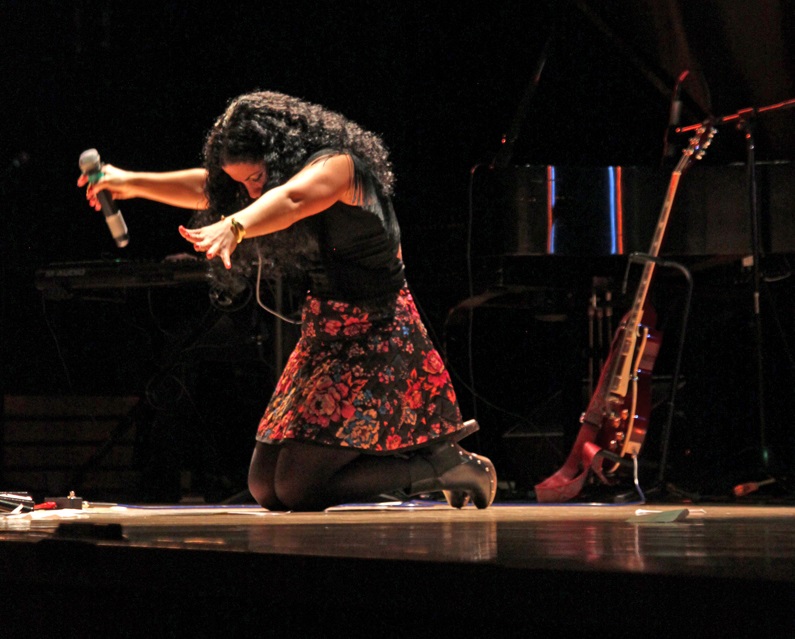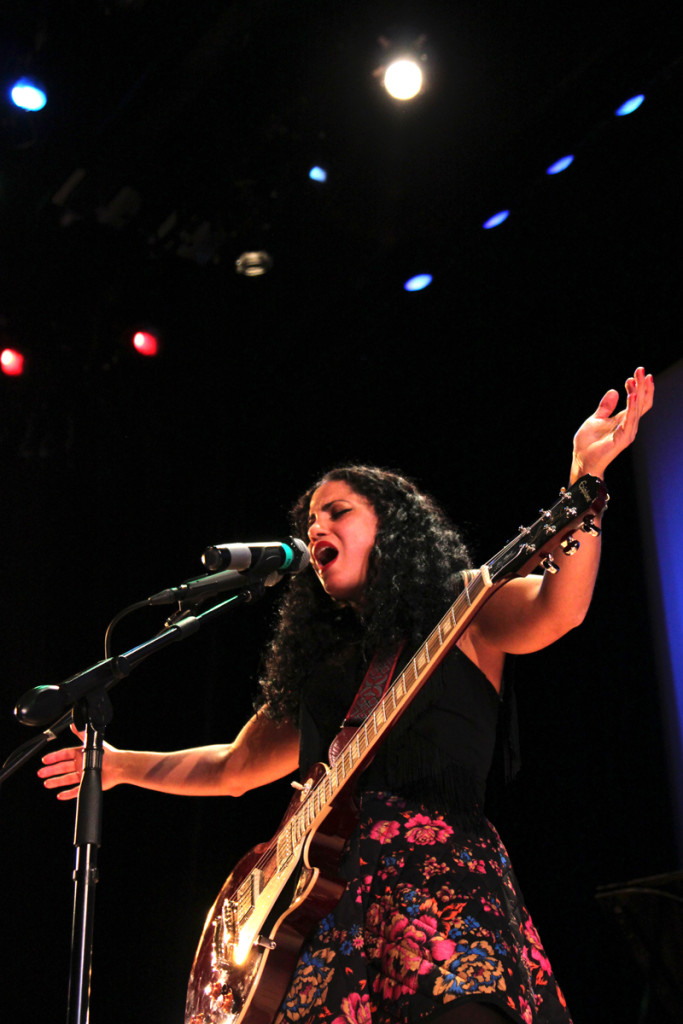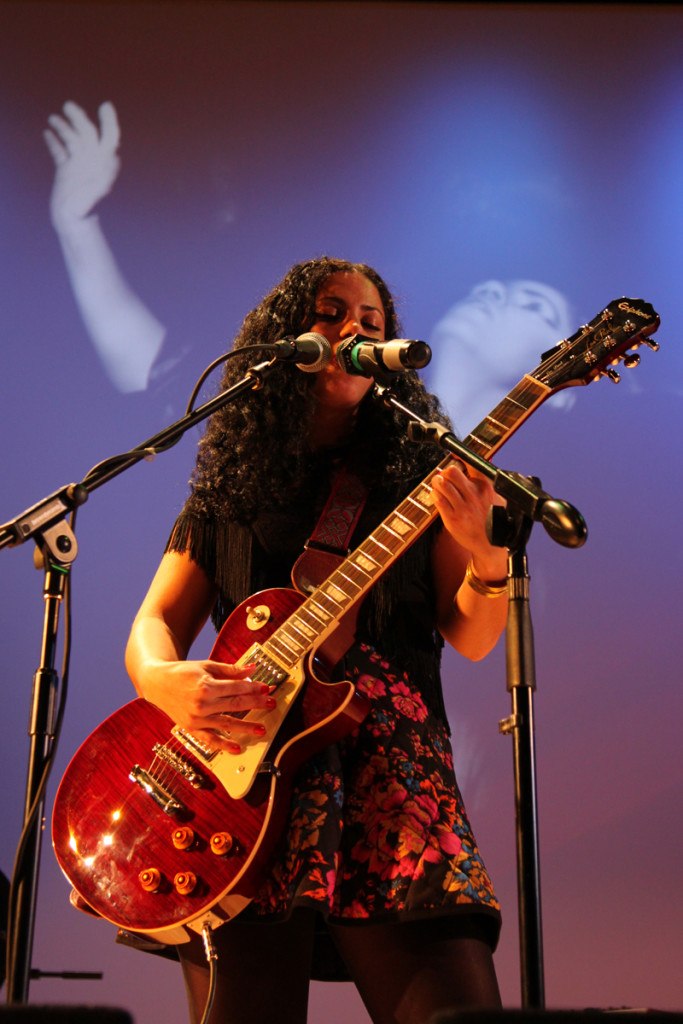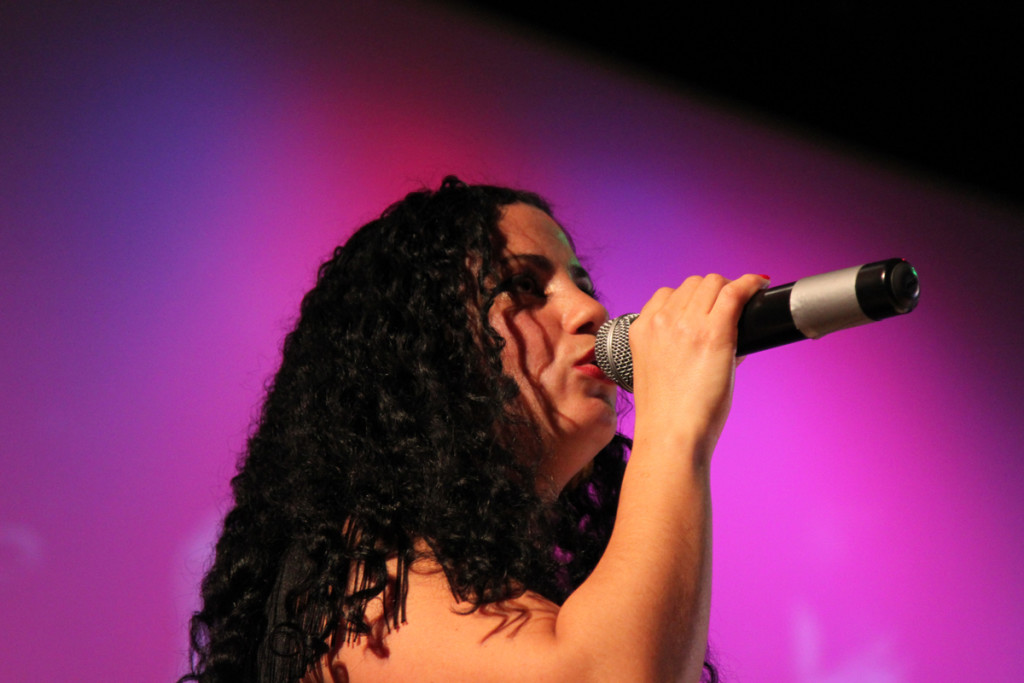Blog March 18, 2016
Emel Mathlouthi: The Voice of the Arab Spring
Emel Mathlouthi has some kind of magic. Not in the mainstream, misguided way women with magic are often conceived–old, wizened and maleficent–but in the way of being a woman wielding an intense and otherworldly power to heal, to move people to feel or act in revolutionary ways. Her voice has the power to overthrow the mighty, in a way. She has been called “the Voice of the Tunisian Revolution” or, more grandly, “the Voice of the Arab Spring.” Before she had even released an album, her songs “Ya Tounes Ya Meskina"(Poor Tunisia) and “Kelmti Horra” (My Word Is Free) became anthems for the simmering revolutionary movement in her native Tunisia. At the time, she was living in Paris, ever since the Ben Ali regime banned her songs from Tunisian airwaves, and when she returned home she was in awe to find so many Tunisian youth singing her words and melodies in protest. Since the revolution succeeded in ousting President Ben Ali in 2011, Mathlouthi has released her first album, Kelmti Horra, toured the world, and was blocked by Israel from performing in Palestine, yet sang at the 2015 Nobel Peace Prize ceremony in a gilded Swedish hall filled with dignitaries. This past Tuesday, March 15, she brought her magic to the stage of the Lycée Francais of New York.
 The performance began with darkness and a low drone, joined by Mathlouthi’s voice intoning the words of “Houdou’on” as the lights rose. Her stage presence was intense, commanding yet humble. She moved from stillness when her ensemble came in— echoing industrial drums and synths—to raise her arms, summoning the music from some deep place. When she wasn't at the center microphone she moved about the stage somewhere between walking and dancing, shifting from sturdiness, like she was bearing some weight of the world, to fluidity, spiraling in defiance of that weight. Watching the video of Mathlouthi singing "Kelmti Horra" amidst a crowd of protesters in Tunis, one can see her overcome the unease of the circumstance, settling into confidence as her voice pierces through the loud chanting nearby. This resoluteness and conviction give her much of her power, inspiring action. The words of "Kelmti Horra" sing: We are free men who have no fear/We are the secrets which never die/And we are the voice of those who stand firm. Her voice brims with yearning, but unlike the nostalgic longing that Americans might call the blues or the Portuguese might call sodade, her vision looks forward, reaching for a future that is defined by peace, solidarity, and freedom.
The performance began with darkness and a low drone, joined by Mathlouthi’s voice intoning the words of “Houdou’on” as the lights rose. Her stage presence was intense, commanding yet humble. She moved from stillness when her ensemble came in— echoing industrial drums and synths—to raise her arms, summoning the music from some deep place. When she wasn't at the center microphone she moved about the stage somewhere between walking and dancing, shifting from sturdiness, like she was bearing some weight of the world, to fluidity, spiraling in defiance of that weight. Watching the video of Mathlouthi singing "Kelmti Horra" amidst a crowd of protesters in Tunis, one can see her overcome the unease of the circumstance, settling into confidence as her voice pierces through the loud chanting nearby. This resoluteness and conviction give her much of her power, inspiring action. The words of "Kelmti Horra" sing: We are free men who have no fear/We are the secrets which never die/And we are the voice of those who stand firm. Her voice brims with yearning, but unlike the nostalgic longing that Americans might call the blues or the Portuguese might call sodade, her vision looks forward, reaching for a future that is defined by peace, solidarity, and freedom.
 Mathlouthi gives voice to these feelings through a skillful blend of musics, from American acoustic folk to trip-hop to Arab pop and folk. She exists somewhere in the juncture of Björk’s electronic instrumentals and intensity, Joan Baez’s spirited political songs, and Lebanese legend Fairouz’s heart-rending vocals, with a side of Jeff Buckley’s emotive moodiness. “Kelmti Horra” feels akin to the protest music of the American folk revival of Baez, Bob Dylan or even Pete Seeger (in fact, Mathlouthi covered Baez's "Here's to You" in response to the self-immolation of Tunisian Mohamed Bouazizi). Songs like "Ma Lkit" (I Have Not Found) and "Libertá" had serious, booming grooves to accompany the fierce vocals (a fiery rawness reminiscent of punk), contrasted with others, particularly her solo songs, which were sparse and made all the more powerful by their restraint. One of the most potent moments of the night was her transfixing, haunting rendition of Björk’s “All Is Full of Love": just her voice, looped and harmonized, and her guitar droning deep, echoing chords. The song felt like an invocation, a cry for the world to realize the vision of the words.
Mathlouthi gives voice to these feelings through a skillful blend of musics, from American acoustic folk to trip-hop to Arab pop and folk. She exists somewhere in the juncture of Björk’s electronic instrumentals and intensity, Joan Baez’s spirited political songs, and Lebanese legend Fairouz’s heart-rending vocals, with a side of Jeff Buckley’s emotive moodiness. “Kelmti Horra” feels akin to the protest music of the American folk revival of Baez, Bob Dylan or even Pete Seeger (in fact, Mathlouthi covered Baez's "Here's to You" in response to the self-immolation of Tunisian Mohamed Bouazizi). Songs like "Ma Lkit" (I Have Not Found) and "Libertá" had serious, booming grooves to accompany the fierce vocals (a fiery rawness reminiscent of punk), contrasted with others, particularly her solo songs, which were sparse and made all the more powerful by their restraint. One of the most potent moments of the night was her transfixing, haunting rendition of Björk’s “All Is Full of Love": just her voice, looped and harmonized, and her guitar droning deep, echoing chords. The song felt like an invocation, a cry for the world to realize the vision of the words.
 Mathlouthi performed "Kelmti Horra" last, noting to the group of Lycée students who joined her singing on stage their good fortune to live in a place that does not deny free speech and that provides opportunities for expression and art. Her whole set was sung in solidarity or in defiance—a song for Syrian refugees, a song for the homeless, a song for the many people who bear the world on their shoulders for the benefit of the few elite. While her magic was palpable in her captivating voice and movement, she was also perfectly human and relatable—a person outraged with injustice, refusing to be passive and using her power to challenge the arbiters of those injustices. During her performance she said, "it is hard to find a melody strong enough to break human madness." Seeing her sing, it's hard not to feel that she has found music with that power, and the revolutions of 2011 support that. We look forward to hearing her forthcoming album, which hopefully will be released soon. For our New York readers, luckily Mathlouthi is performing again in this city, Sat., March 19 at the National Sawdust in Williamsburg. We highly encourage you to make the trip and experience of the magic yourself.
Mathlouthi performed "Kelmti Horra" last, noting to the group of Lycée students who joined her singing on stage their good fortune to live in a place that does not deny free speech and that provides opportunities for expression and art. Her whole set was sung in solidarity or in defiance—a song for Syrian refugees, a song for the homeless, a song for the many people who bear the world on their shoulders for the benefit of the few elite. While her magic was palpable in her captivating voice and movement, she was also perfectly human and relatable—a person outraged with injustice, refusing to be passive and using her power to challenge the arbiters of those injustices. During her performance she said, "it is hard to find a melody strong enough to break human madness." Seeing her sing, it's hard not to feel that she has found music with that power, and the revolutions of 2011 support that. We look forward to hearing her forthcoming album, which hopefully will be released soon. For our New York readers, luckily Mathlouthi is performing again in this city, Sat., March 19 at the National Sawdust in Williamsburg. We highly encourage you to make the trip and experience of the magic yourself.

 The performance began with darkness and a low drone, joined by Mathlouthi’s voice intoning the words of “Houdou’on” as the lights rose. Her stage presence was intense, commanding yet humble. She moved from stillness when her ensemble came in— echoing industrial drums and synths—to raise her arms, summoning the music from some deep place. When she wasn't at the center microphone she moved about the stage somewhere between walking and dancing, shifting from sturdiness, like she was bearing some weight of the world, to fluidity, spiraling in defiance of that weight. Watching the video of Mathlouthi singing "Kelmti Horra" amidst a crowd of protesters in Tunis, one can see her overcome the unease of the circumstance, settling into confidence as her voice pierces through the loud chanting nearby. This resoluteness and conviction give her much of her power, inspiring action. The words of "Kelmti Horra" sing: We are free men who have no fear/We are the secrets which never die/And we are the voice of those who stand firm. Her voice brims with yearning, but unlike the nostalgic longing that Americans might call the blues or the Portuguese might call sodade, her vision looks forward, reaching for a future that is defined by peace, solidarity, and freedom.
The performance began with darkness and a low drone, joined by Mathlouthi’s voice intoning the words of “Houdou’on” as the lights rose. Her stage presence was intense, commanding yet humble. She moved from stillness when her ensemble came in— echoing industrial drums and synths—to raise her arms, summoning the music from some deep place. When she wasn't at the center microphone she moved about the stage somewhere between walking and dancing, shifting from sturdiness, like she was bearing some weight of the world, to fluidity, spiraling in defiance of that weight. Watching the video of Mathlouthi singing "Kelmti Horra" amidst a crowd of protesters in Tunis, one can see her overcome the unease of the circumstance, settling into confidence as her voice pierces through the loud chanting nearby. This resoluteness and conviction give her much of her power, inspiring action. The words of "Kelmti Horra" sing: We are free men who have no fear/We are the secrets which never die/And we are the voice of those who stand firm. Her voice brims with yearning, but unlike the nostalgic longing that Americans might call the blues or the Portuguese might call sodade, her vision looks forward, reaching for a future that is defined by peace, solidarity, and freedom.
 Mathlouthi gives voice to these feelings through a skillful blend of musics, from American acoustic folk to trip-hop to Arab pop and folk. She exists somewhere in the juncture of Björk’s electronic instrumentals and intensity, Joan Baez’s spirited political songs, and Lebanese legend Fairouz’s heart-rending vocals, with a side of Jeff Buckley’s emotive moodiness. “Kelmti Horra” feels akin to the protest music of the American folk revival of Baez, Bob Dylan or even Pete Seeger (in fact, Mathlouthi covered Baez's "Here's to You" in response to the self-immolation of Tunisian Mohamed Bouazizi). Songs like "Ma Lkit" (I Have Not Found) and "Libertá" had serious, booming grooves to accompany the fierce vocals (a fiery rawness reminiscent of punk), contrasted with others, particularly her solo songs, which were sparse and made all the more powerful by their restraint. One of the most potent moments of the night was her transfixing, haunting rendition of Björk’s “All Is Full of Love": just her voice, looped and harmonized, and her guitar droning deep, echoing chords. The song felt like an invocation, a cry for the world to realize the vision of the words.
Mathlouthi gives voice to these feelings through a skillful blend of musics, from American acoustic folk to trip-hop to Arab pop and folk. She exists somewhere in the juncture of Björk’s electronic instrumentals and intensity, Joan Baez’s spirited political songs, and Lebanese legend Fairouz’s heart-rending vocals, with a side of Jeff Buckley’s emotive moodiness. “Kelmti Horra” feels akin to the protest music of the American folk revival of Baez, Bob Dylan or even Pete Seeger (in fact, Mathlouthi covered Baez's "Here's to You" in response to the self-immolation of Tunisian Mohamed Bouazizi). Songs like "Ma Lkit" (I Have Not Found) and "Libertá" had serious, booming grooves to accompany the fierce vocals (a fiery rawness reminiscent of punk), contrasted with others, particularly her solo songs, which were sparse and made all the more powerful by their restraint. One of the most potent moments of the night was her transfixing, haunting rendition of Björk’s “All Is Full of Love": just her voice, looped and harmonized, and her guitar droning deep, echoing chords. The song felt like an invocation, a cry for the world to realize the vision of the words.
 Mathlouthi performed "Kelmti Horra" last, noting to the group of Lycée students who joined her singing on stage their good fortune to live in a place that does not deny free speech and that provides opportunities for expression and art. Her whole set was sung in solidarity or in defiance—a song for Syrian refugees, a song for the homeless, a song for the many people who bear the world on their shoulders for the benefit of the few elite. While her magic was palpable in her captivating voice and movement, she was also perfectly human and relatable—a person outraged with injustice, refusing to be passive and using her power to challenge the arbiters of those injustices. During her performance she said, "it is hard to find a melody strong enough to break human madness." Seeing her sing, it's hard not to feel that she has found music with that power, and the revolutions of 2011 support that. We look forward to hearing her forthcoming album, which hopefully will be released soon. For our New York readers, luckily Mathlouthi is performing again in this city, Sat., March 19 at the National Sawdust in Williamsburg. We highly encourage you to make the trip and experience of the magic yourself.
Mathlouthi performed "Kelmti Horra" last, noting to the group of Lycée students who joined her singing on stage their good fortune to live in a place that does not deny free speech and that provides opportunities for expression and art. Her whole set was sung in solidarity or in defiance—a song for Syrian refugees, a song for the homeless, a song for the many people who bear the world on their shoulders for the benefit of the few elite. While her magic was palpable in her captivating voice and movement, she was also perfectly human and relatable—a person outraged with injustice, refusing to be passive and using her power to challenge the arbiters of those injustices. During her performance she said, "it is hard to find a melody strong enough to break human madness." Seeing her sing, it's hard not to feel that she has found music with that power, and the revolutions of 2011 support that. We look forward to hearing her forthcoming album, which hopefully will be released soon. For our New York readers, luckily Mathlouthi is performing again in this city, Sat., March 19 at the National Sawdust in Williamsburg. We highly encourage you to make the trip and experience of the magic yourself.










